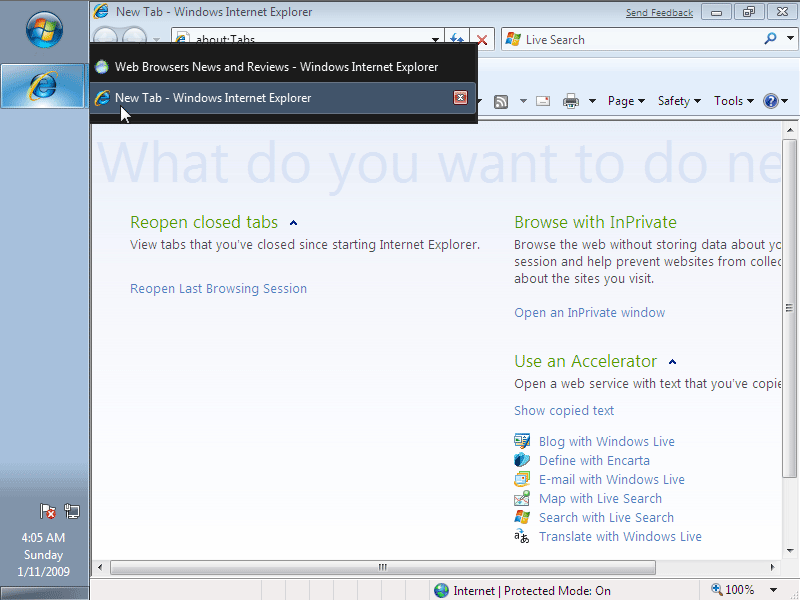Speed Up Internet Explorer
 Now here is something for you, IE users. Five tweaks to increase Internet Explorer performance. Written by reliancep
Now here is something for you, IE users. Five tweaks to increase Internet Explorer performance. Written by reliancep
1. Turn off Phishing Filter. This feature supposedly helps to prevent you from being tricked into accessing a rogue web site that is masquerading as a bona fide web site. I’ve found this feature to really slow down web access at times. Microsoft released a patch that supposedly fixes the problem, but my computer has the patch and I still notice this feature slowing down web access. If you think you can live without the extra protection of IE7 anti-phishing, you can disable it by starting IE7 and then going to: Continue Reading
New Apple Safari Vulnerability Discovered
 Guy Brian has discovered a new Safari vulnerability which affects Mac OS X 10.5 (Leopard) users who haven’t changed default feed reader preferences.
Guy Brian has discovered a new Safari vulnerability which affects Mac OS X 10.5 (Leopard) users who haven’t changed default feed reader preferences.
This vulnerability allows phishing sites to silently read all the user data from hard drive without him knowing that.
There is however a workaround for Safari users on Windows OS. Continue Reading
Speed Up Opera
 Followed by Speed up Firefox articles, here are some tips by Sid on how you can increase Opera’s performance.
Followed by Speed up Firefox articles, here are some tips by Sid on how you can increase Opera’s performance.
Windows 7 Beta and Internet Explorer 8 Experience
I was playing with the public beta of Windows 7 for a while now and decided to show you a few neat features of it while browsing with Internet Explorer and just show the overall experience.
Mozilla Drops Google in Firefox 3.1 and Tries Yandex
 It looks like Mozilla is trying some other players as well. As for now, Firefox default search engine for Russian language users will be Yandex instead of everyone’s beloved Google.
It looks like Mozilla is trying some other players as well. As for now, Firefox default search engine for Russian language users will be Yandex instead of everyone’s beloved Google.
According to research studies conducted by TNS, FOM, and Comcon, Yandex is the largest resource and largest search engine in Russian Internet, based on the audience size and internet penetration. Continue Reading
Chrome 2.0 Development Preview
 Google has unveiled Chrome 2.0 in the developer channel (like Mozilla Minefields) on Thursday; some of the new features are:
Google has unveiled Chrome 2.0 in the developer channel (like Mozilla Minefields) on Thursday; some of the new features are:
• Support for gradients, reflections and masks
• Faster rendering enhancements
• New user interface features
• Augmented extensibility like user scripting
• Edge Docking
• Full page zoom
• Form autocompletion
• Support for importing (but not synchronizing) Google Bookmarks
• Middle-click drag scrolling
The complete review at arstechnica.com
Only the 4.13% Of the Web Is Standards Compliant
According to a study made by Metadata Analysis and Mining Application (MAMA), a tool created by Opera that crawls the web and indexes the markup and scripting data from approximately 3.5 million pages.
Some of the most relevant parts of the study are:
• About 35% of all web sites use Adobe Flash.
• XMLHttpRequest (AJAX) scripting mechanism is used by only 3.2%
• CSS is used in the 80% of the web sites.
• Javascript is used in 75% of them.
• Using the W3C validation tools, shows that 4.13% are valid, which only 50% using the validation badge are valid.
Read the complete article at arstechnica.com
[digg-reddit-me]
Site Compatibility or Browser Compatibility
 It has been a big debate whether websites are not compatible with browsers or browsers are not compatible with websites. While webmasters and web developers claim that a certain browser is not compatible with their website, browser companies fight back saying that the websites are indeed not compatible with the browser and sometimes have even been proved. Continue Reading
It has been a big debate whether websites are not compatible with browsers or browsers are not compatible with websites. While webmasters and web developers claim that a certain browser is not compatible with their website, browser companies fight back saying that the websites are indeed not compatible with the browser and sometimes have even been proved. Continue Reading

 Internet Explorer
Internet Explorer


